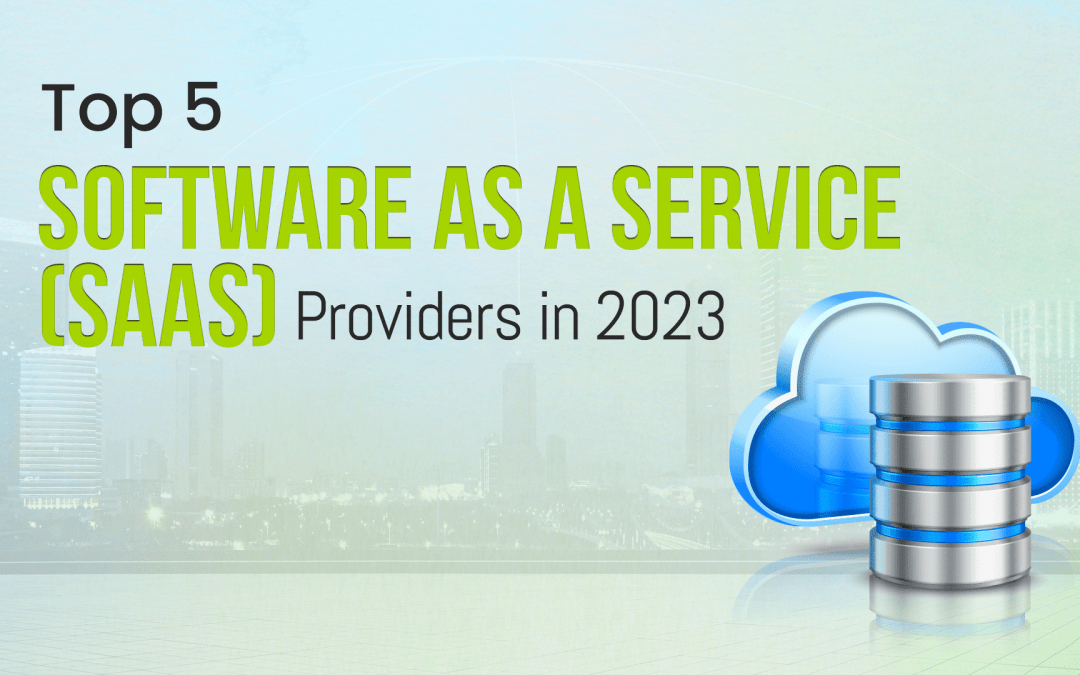The nature of businesses and the workplace has changed a lot in recent years. Gone are the days when companies would rely on traditional offices and on-premises infrastructure to perform their routine tasks. The rise of online collaboration between virtual teams and tremendous growth in digital services has increased the demand for cloud solutions. Let’s talk about SaaS providers.
As a result, SaaS continues to be the preferred choice of companies looking to expand globally by leveraging technology. Today, 93% of organizational operations are managed with SaaS solutions. With the rapid adoption of SaaS applications, experts have predicted that the global SaaS market would reach %195 billion in 2023.
Hence, after comprehensive research and data analysis, we have shortlisted the top 5 SaaS providers that are currently leading the international market.
So, let’s explore!
An Introduction to SaaS Provider
A SaaS provider specializes in SaaS and delivers cloud-based solutions with specific features. A SaaS agency can be B2B or B2C depending on its customers’ needs and areas of expertise. For instance, SaaS companies offering workforce management software are B2B while those delivering e-commerce services are B2C.
Choosing a reliable SaaS business partner is crucial to business success. As an entrepreneur, you have to make sure your SaaS agency understands your client’s specific requirements and possesses the required expertise to deliver value. Hence, conduct comprehensive research exploring the track record, customer feedback, and level of expertise before making the final decision.
Top 5 SaaS Providers in 2023
Check out the list of the world’s 5 leading SaaS providers based on their market share, service quality, and client satisfaction level:
1. Microsoft (Cloud SaaS)
The day Microsoft moved its desktop productivity suite Microsoft Office 365 to the cloud, it began its journey towards becoming the world’s largest SaaS company with 1.4 billion users worldwide. In a very short time, Office 365 became the preferred choice of businesses across diverse sectors and sizes.
In this cloud suite, Microsoft offers Dynamics CRM and SQL Server databases. Besides, companies using Office 365 can use SharePoint collaboration to promote teamwork and improve operational efficiency. Over the years, Microsoft has introduced several new features to help companies in customer acquisition, onboarding, success, and retention.
Hence, the world’s leading enterprises with a wide array of customers use Microsoft Office 365 to achieve their desired objectives.
2. Google Workspace (Productivity)
Google Workspace is a suite of cloud computing, productivity, and collaboration tools like Gmail, Calendar, Storage, etc. Formerly known as G-Suite, Google Workspace is used by over 90% of Fortune companies. Besides, it has more than 6 million pay business customers that rely on its cloud services to collaborate and achieve higher productivity levels.
The updated version of Google Workspace also offers customer email and 24/7 support features. Subscribers can access all these features by choosing suitable pricing plans that offer a large collection of enterprise solutions.
3. Salesforce (CRM)
Salesforce is another renowned SaaS company specializing in CRM solutions for different sectors. Being of the top cloud computing enterprises with a market capitalization of $208.91 billion, Salesforce has 150,000 users worldwide, mostly small businesses.
In addition to developing CRM solutions, Salesforce has also proved its expertise in marketing, social networking, platform development, analytics, and machine learning. Most of the annual recurring revenue of Salesforce comes from the cloud SaaS tool set.
The strength of Salesforce lies in the user-friendly interface of its CRM which offers a wide range of third-party integrations. Businesses can use Salesforce to automate email marketing and task management and achieve their desired objectives.
4. Zoom (Collaboration)
Whether you’re a student, a teacher, a business owner, or a professional, you must have at least once used Zoom to conduct virtual meetings. Zoom is among the very few SaaS platforms that have gained tremendous popularity in a very short period. According to an estimate, over 200 million daily video calls were being made by Zoom by the end of March 2020.
So, what makes Zoom so popular? Let’s start with its ease of use, which makes it possible even for beginners to make video calls without any hassle. Secondly, it is a lightweight collaboration platform with versatile features and reliable connections. Moreover, you can use Zoom to chat with your friends and team members, participate in online webinars, and organize video and audio conferencing.
Today, Zoom handles over 300 million daily meetings across the globe. Besides, the company generated more than $4.09 billion in revenues in 2022.
5. HubSpot (Inbound Marketing, Sales, & CRM)
Whenever there is a discussion on marketing automation, HubSpot is the top choice of marketers from leading organizations globally. This high-tech inbound marketing SaaS streamlines sales & marketing and allows companies to reach potential customers with ease. Besides, companies can use this tool for content management, social media marketing, SEO, and much more.
Similarly, HubSpot also offers additional CRM features that allow businesses to enhance their customer experiences by providing them with impeccable support. In the third quarter of 2022, HubSpot recorded a 24% rise in its number of customers.
Final Words
SaaS business transformation has become a necessity for corporate success in today’s hyper-competitive business landscape. Companies moving toward SaaS are more likely to achieve their desired objectives than those relying on traditional software.
As the corporate world inches towards the next phase of digital transformation, more and more companies are adopting SaaS applications. These next-generation cloud systems are robust, deliver impeccable results, and help companies stay ahead of their competitors.
Currently, the world’s top 5 SaaS providers are Microsoft 365, Google Workspace, Zoom, HubSpot, and Salesforce. Millions of users worldwide rely on these SaaS apps to streamline their operations and accomplish their projected goals.

